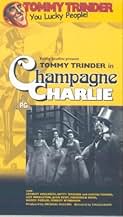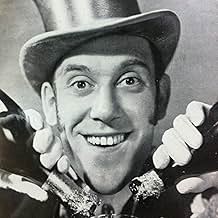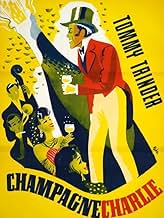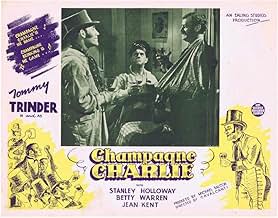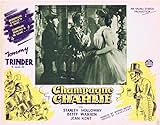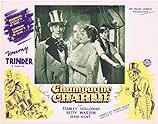Ajouter une intrigue dans votre langueThe story of a 19th century English music hall performer and life behind the scenes.The story of a 19th century English music hall performer and life behind the scenes.The story of a 19th century English music hall performer and life behind the scenes.
- Réalisation
- Scénario
- Casting principal
Bill Shine
- Mogador Stage Manager
- (as Billy Shine)
Andreas Malandrinos
- Gatti
- (as Andrea Malandrinos)
Peter De Greef
- Lord Petersfield (His Son)
- (as Peter De Greeff)
Avis à la une
This must be the first time since the nineteenth century that the audience for a show could be heard to leave the building still humming 'Champagne Charlie' :-) (In fact, I did wonder if we were going to get some audience participation at one point -- I was on the verge of it myself -- and am curious as to whether sing-alongs ever happened during the original screenings.) This is a wonderful experience, with Tommy Trinder clearly in his element as music-hall entertainer George Leybourne: his singing voice clearly doesn't equal that of Stanley Holloway, but he can put over the songs so well that you can credit him as a serious competitor... if one can ever describe either of these two as 'serious'! Betty Warren is magnificent in every sense of the word, the very image (and figure) of a Victorian stage star, brimming with coquetry, charisma and sound business sense, and it's a pity that the only number featuring these three together gives her so little to do. A host of minor, unnamed but recurring characters bring the genial, raucous world of the music hall to life, with its flickering stage flares, its haze of smoke and its plentiful supply of drink.
But the true stars of the picture are surely the composers and lyricists who contributed the host of songs that enliven the soundtrack, the new music fitting seamlessly with such genuine period hits as "Champagne Charlie" and "The Daring Young Man on the Flying Trapeze". The plot requires the rival stars to cap one another with song after song on the theme of alcohol, every one of which has to be a credible smash hit: with writers like Billy Mayerl and Noel Gay involved, plus the bravura delivery of the two vocalists, the audience both offscreen and on are completely convinced.
But the true stars of the picture are surely the composers and lyricists who contributed the host of songs that enliven the soundtrack, the new music fitting seamlessly with such genuine period hits as "Champagne Charlie" and "The Daring Young Man on the Flying Trapeze". The plot requires the rival stars to cap one another with song after song on the theme of alcohol, every one of which has to be a credible smash hit: with writers like Billy Mayerl and Noel Gay involved, plus the bravura delivery of the two vocalists, the audience both offscreen and on are completely convinced.
The rivalry between George Laybourne and The Great Vance in the music hall era.
I enjoyed this for its affectionate look into a bygone era of British culture, it's amusing characters and impressive set pieces.
The plot is a character-driven and fairly nonintrusive excuse to show a number of musical hall sequences and songs relating to the era. It is very much a film of two halves, with the rivalry between the two great musical hall stars in the first half and the struggle to keep the musical halls open taking focus in the second. A sub-plot involves a fairly uninspired romance.
There are a number of pub and musical hall set-pieces that work very well to capture the tone of the movie and it's subject matter. I found all these scenes highly entertaining. I try to imagine myself watching this in 1944 when the world was in devastation and in need of some positive escapism. It hardly feels authentic Victorian Britain, bit it certainly makes you want to go out, have a few drinks and enjoy yourself in a crowd of friends.
The songs are all good fun but pretty forgettable in the grand scheme of movie music. For me it's all the social settings, high energy, humour and enthusiasm that give it charm.
Performances are mixed, with charismatic stars Tommy Trinder and Stanley Holloway excellent as the above mentioned protagonists, but for me its Betty Warren who holds it altogether with a quite dominant turn as Bessie Bellwood. Most supporting roles are fairly uninspired, however Jean Kent does have a certain presence Dolly.
It's remarkable when you consider that this era depicts entertainment that predates radio broadcasting. Outside of church, this would have been a victorian equivalent of screen time. You look around at the world now and marvel at how much investment and technology has gone into providing people with that continual fix in the palm of their hand.
For me its 6.5/10, but I round upwards.
I enjoyed this for its affectionate look into a bygone era of British culture, it's amusing characters and impressive set pieces.
The plot is a character-driven and fairly nonintrusive excuse to show a number of musical hall sequences and songs relating to the era. It is very much a film of two halves, with the rivalry between the two great musical hall stars in the first half and the struggle to keep the musical halls open taking focus in the second. A sub-plot involves a fairly uninspired romance.
There are a number of pub and musical hall set-pieces that work very well to capture the tone of the movie and it's subject matter. I found all these scenes highly entertaining. I try to imagine myself watching this in 1944 when the world was in devastation and in need of some positive escapism. It hardly feels authentic Victorian Britain, bit it certainly makes you want to go out, have a few drinks and enjoy yourself in a crowd of friends.
The songs are all good fun but pretty forgettable in the grand scheme of movie music. For me it's all the social settings, high energy, humour and enthusiasm that give it charm.
Performances are mixed, with charismatic stars Tommy Trinder and Stanley Holloway excellent as the above mentioned protagonists, but for me its Betty Warren who holds it altogether with a quite dominant turn as Bessie Bellwood. Most supporting roles are fairly uninspired, however Jean Kent does have a certain presence Dolly.
It's remarkable when you consider that this era depicts entertainment that predates radio broadcasting. Outside of church, this would have been a victorian equivalent of screen time. You look around at the world now and marvel at how much investment and technology has gone into providing people with that continual fix in the palm of their hand.
For me its 6.5/10, but I round upwards.
Joe/George (Tommy Trinder) and the Great Vance (Stanley Holloway) have a Music-Hall rivalry in the ale-houses of Victorian England. When the theatre owners threaten to close down the music-halls, George and Vance come together to fight off the threat.
There is strangely no romance for the lead characters in this story. This is given to Jean Kent as "Dolly" to play out with some complete non-entity. It has relevance to the story but, unfortunately, the story isn't exactly gripping. We are subjected to lots of forgettable songs that all sound the same. The most memorable part of the film is an amusing section about a duel between the two main rivals and it is actually quite funny. Far better than the appalling attempt at making a humorous duel scene that was made by another British film, "Vice Versa", in 1948. "Champagne Charlie" passes the time, reminds us of a time now forgotten, and you will enjoy the film if you like boring sing-a-longs.
There is strangely no romance for the lead characters in this story. This is given to Jean Kent as "Dolly" to play out with some complete non-entity. It has relevance to the story but, unfortunately, the story isn't exactly gripping. We are subjected to lots of forgettable songs that all sound the same. The most memorable part of the film is an amusing section about a duel between the two main rivals and it is actually quite funny. Far better than the appalling attempt at making a humorous duel scene that was made by another British film, "Vice Versa", in 1948. "Champagne Charlie" passes the time, reminds us of a time now forgotten, and you will enjoy the film if you like boring sing-a-longs.
There's a lot of Victorian music hall songs in this film about a man who travels from Leybourne in the north down to London to help his brother get a job in a boxing ring. After he sings a song in a bar ("an 'alf of 'alf an' 'alf"), he is taken on as a singer and later gets a job in a music hall, which is a dinner theatre, not like on "The Good Old Days". A parliamentary enquiry aims to shut down music halls for intemperate behaviour. Stanley Holloway is "The Great Vance", a rival in another music hall. Songs include "Don't bring shame on the old folks", the risqué "Come On Algernon", "'it 'im on the boko", "Strolling in the park" , then a series of drink related songs (which all sound very similar) - "Ale, old ale", "I like a drop of gin", "Burgundy, claret and port", "Yo ho ho rum", "The brandy and seltzer boys", "A glass of sherry wine", and the title "Champagne Charlie". Then "The daring young man on the flying trapeeze", and the risqué "Hunting after dark", and "By and by".
This film is the nearest that Ealing Studios came to making a musical, but the final result is something quite different from that of MGM or Warner Bros. Imagine a full blooded b/w Victorian etching, lit by gas lamps and studded with glittering period detail. The songs are brash, catchy and bright. The direction by Cavancanti brings in his documentary realism with fast cutting, high and low angle shots - breaking with convention at every chance. The result of all this is that the film has hardly dated. It isn't well known, but it ought to be rediscovered. The photography sparkles and shines on carefully recreated 1860 London settings. If the film has a fault, it is that in trying to avoid formula, it often skips over details. For example, we aren't given time to understand how many of the songs are written. The title character was a real life singer - George Leybourne. Wartime comedian Tommy Trinder is obviously enjoying the part and Stanley Holloway provides strong support. In 1944 this film was designed to raise morale and generate goodwill. It still does.
Le saviez-vous
- AnecdotesFilm debut of Hazel Court, who had one line of dialogue.
- Crédits fousOpening credits prologue: In the year of Grace 1860, two brothers set out from the mining village of Leybourne for London Town . . . .
- ConnexionsFeatured in Those British Faces: A Tribute to Stanley Holloway 1890-1982 (1993)
- Bandes originalesThe Man on the Flying Trapeze
(uncredited)
Music by Alfred Lee
Lyrics by George Leybourne
Arranged by Ernest Irving
Meilleurs choix
Connectez-vous pour évaluer et suivre la liste de favoris afin de recevoir des recommandations personnalisées
Détails
- Durée1 heure 45 minutes
- Couleur
- Rapport de forme
- 1.37 : 1
Contribuer à cette page
Suggérer une modification ou ajouter du contenu manquant

Lacune principale
By what name was Champagne Charlie (1944) officially released in Canada in English?
Répondre
